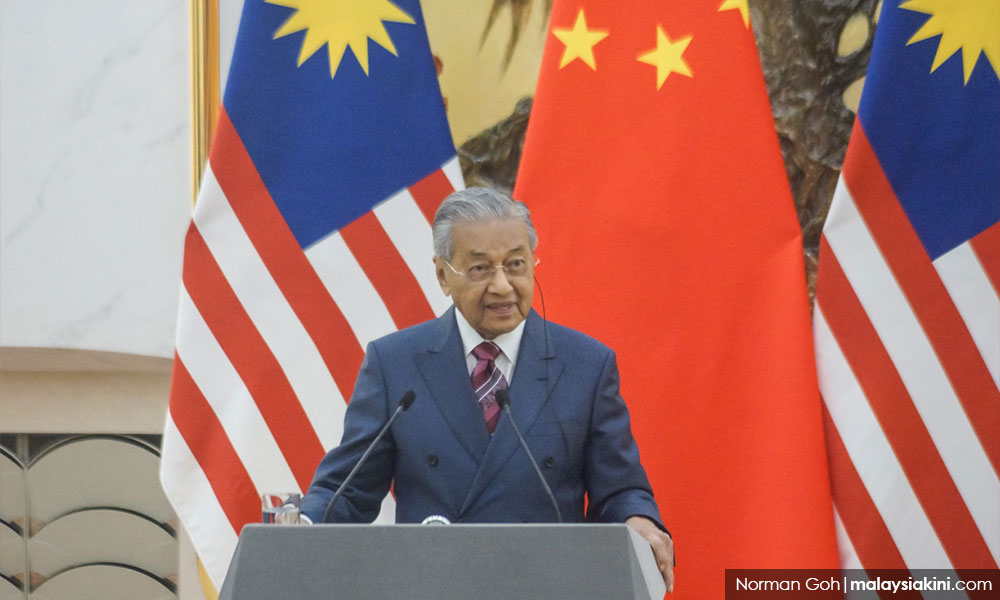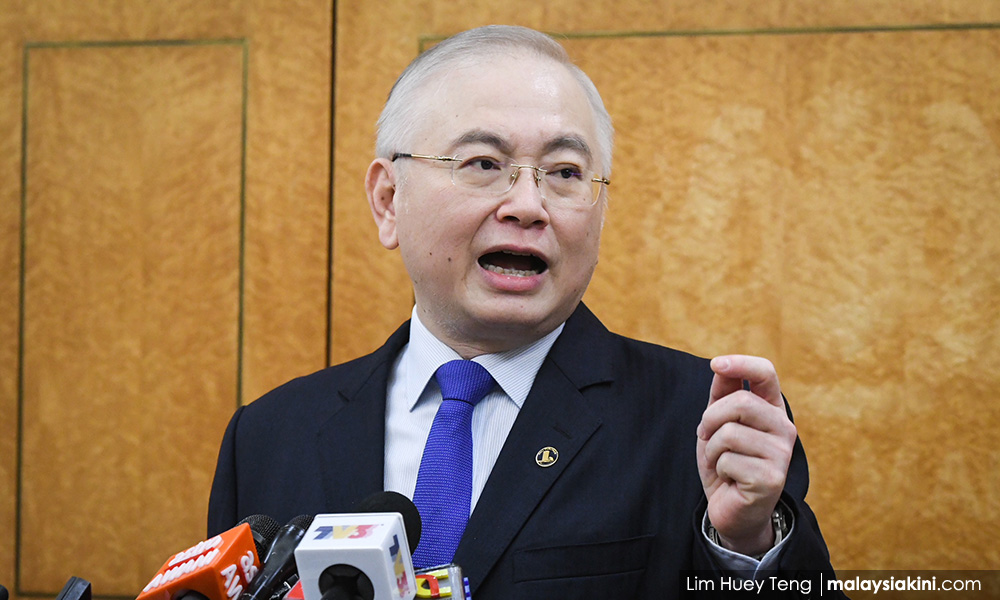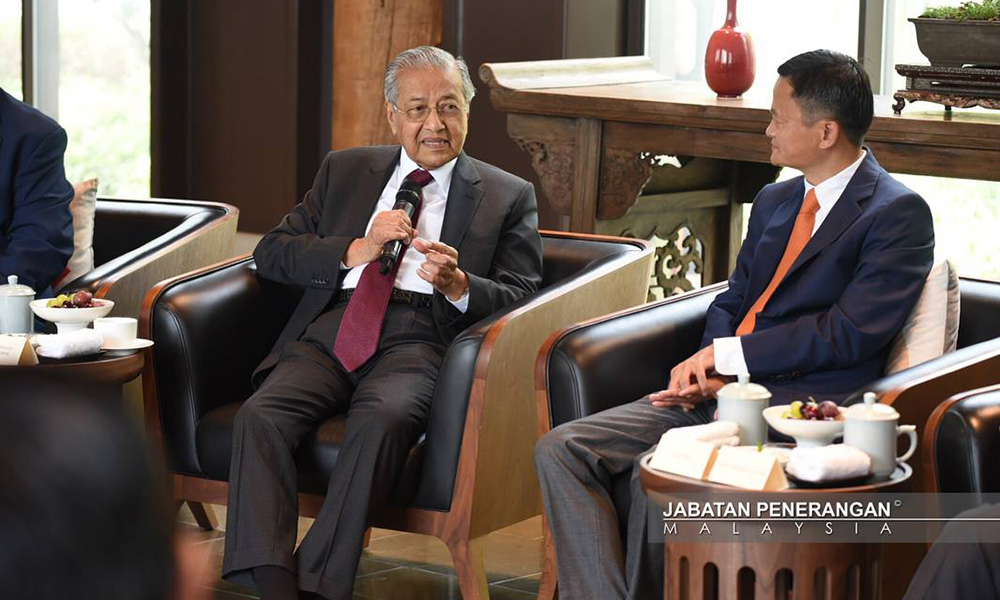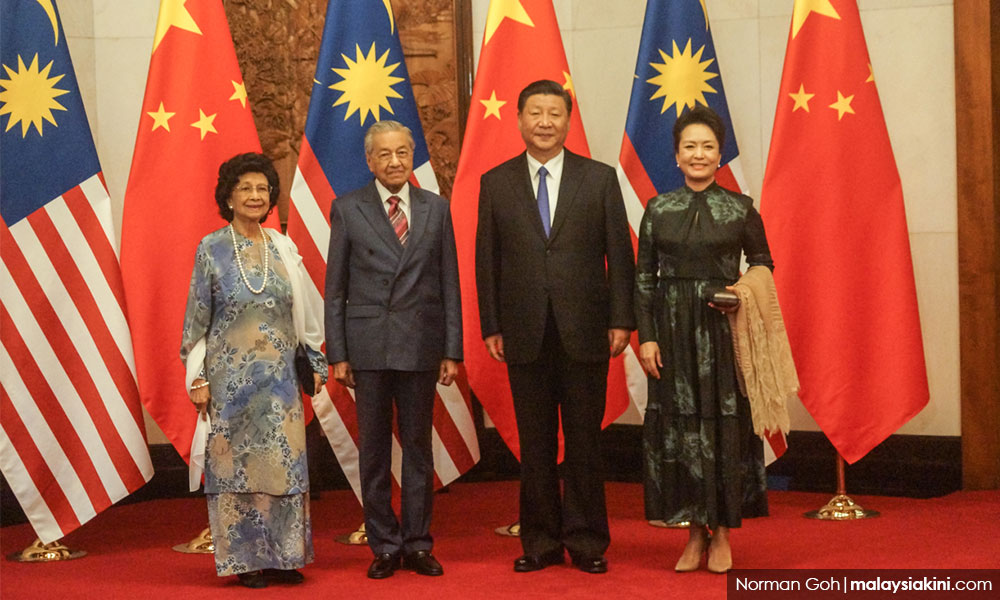
By Wee Ka Siong's definition, Malaysia has just experienced a diplomatic meltdown in the heart of China in Beijing.
Wee is, of course, the lone MCA member of parliament for Ayer Hitam in Johor. But how did Prime Minister Dr Mahathir Mohamad fail?
First of all, Mahathir did not manage to reduce the price of the East Coast Rail Link nor was he able to renegotiate the terms of two pipeline projects. Rather, Mahathir has had to cancel all three, Wee argued. That means failure.
But then Wee was quick to add that his definition of a failure was gleaned from media reports; though one should add that Wee did not say if he was referring to international or vernacular news accounts.
The quick attribution to news media, invariably, as the source of their interpretation of what constitutes a success or failure, is a standard operating routine that lame politicians like to use.
If Mahathir's trip turns out to be a success in future - which it will - Wee can always blame the messenger, which is the media that carried the news; not his over-the-top and, ironically, weak analysis, if one can even call it such, since Wee was indeed peddling sheer pulp.
Secondly, to make matters worse once again, according to Wee - Mahathir crossed the line of diplomatic propriety by cancelling these three projects while still in China.
In other words, Wee was implying that a democratically elected leader from Malaysia should be deferential to China first. If any questionable projects should be abolished or stopped, such announcements should be made after Mahathir is well and safe in Malaysia.
One wonders if Wee understood at all the freedom of expression? Such a freedom accords the person the right to express his or her view responsibly, whether in or out of China. On every score, Wee was further unclear about the context of the trip itself.
To begin with, the trip was a culmination of the people's will on May 9, when BN was thoroughly defeated at the ballot box. Mahathir was not in China to protect the “face” or pet projects of anyone in Malaysia, period.
If a project is “stupid”, Mahathir would merely call a spade a spade, given his trademark bluntness. This is what makes Malaysia able to stand proud, unless Wee is a subscriber to the belief that you can never tell the truth to the powers-that-be.
Secondly, the Council of Eminent Persons and the cabinet had on various occasions spoken of the questionable nature of all three projects; whether in the form of their sustainability or financial integrity. Cancelling them does not constitute a breach of the Belt and Road Initiative (BRI).
If anything, there is zero correlation with BRI unless the association with it is forced and imposed as a label anyway. To be sure, how can a 688-kilometre single-track train route from Klang to Kelantan be important to BRI, if there are already ships that can berth in Terengganu, Pahang and Johor? Indeed, how can two pipelines be vital to BRI if all they did was to sell gas for internal consumption?
Further, what is the actual integrity of the pipeline projects anyway when shady systems of payments have been discovered?
Thus, both Mahathir and Finance Minister Lim Guan Eng remain bewildered as to why 90 percent of the capital on the pipelines had been paid when only 13 per cent of the projects had been completed so far.
Put differently, if the term “failure” can be ascribed to the Sino-Malaysian relationship in this trip, surely the blame falls squarely on the previous group of leaders who helmed the Malaysian government.
But then any attempt to do so, would be akin to blaming the current Sino-Malaysian predicament, time and again, on the past. This would neither be practical nor productive.
As a parliamentarian, Wee should not be obsequious or fastidious about protecting the “face” of foreign governments, when Wee's current position, indeed, perks and pay, are all coming from the tax dollars of Malaysian citizens.
To say that Wee is now an embarrassment to Malaysia would be an understatement. His grey eminence is a reflection of his inability to think out of the box both before and after the 14th general election.

The sea change in Malaysia after the 14th general election was conceded even by leaders in Beijing.
If it was not so, three of the top leaders in China would not have made it a point to meet Mahathir at all, just as China occasionally overlooks the importance of engaging Japanese leaders completely.
Importance of connections
But, there were three other ways Wee got it wrong on Mahathir's trip. First of all, Mahathir travelled to China over two legs. The first portion of his trip had Mahathir in Hangzhou, China, the birthplace of e-commerce site Alibaba, where Tun Dr Mahathir had hoped to learn more from founder Jack Ma about the benefits of e-commerce. He did, and was impressed with what Alibaba could do.
Wee, by overemphasising the entirety of the trip on the fate of the three projects, reeks of the old BN mentality too. This is one area where Wee should and must change, without which Wee will always conflate politics with projects only.
Wee, an old BN hand, seemed bent on believing that a diplomatic trip can only be successful when there are trinkets galore, invariably, packed and packaged in the form of a multitude of Chinese handouts, financial incentives and precious Chinese soft loans. “No money, no honey” seems to be Wee's and BN's thinking, or what Mahathir criticised as "Cash is king".
But in China, cash is not king. Connections are king. Mahathir seems to be have got it right. How? Well, although Alibaba’s Ma was once an ally of former prime minister Najib Abdul Razak, Jack is now a friend of Mahathir.
By knowing Ma, Mahathir is connected to Masayoshi Son and Jerry Yang, two of Alibaba’s biggest backers who jointly own a total of 50 percent of its shares.

Return trips
Secondly, a diplomatic trip to China cannot be a one-off event. President Joko Widodo of Indonesia, for example, has had to make nine trips to China over the spate of the last five years.
And, Indonesia has a population which is nearly nine times that of Malaysia too. If a nation of 270 million Indonesians cannot get everything right in one trip to China, it stands to reason - both diplomatic and otherwise - that neither can Malaysia.
Let's use a local analogy to amplify this point.
As a lone MP of Ayer Hitam in Johor, can Wee win over the hearts and minds of his constituency by going back once a year or once a month? The answer is a categorical "No."
Indeed, Wee returns to Ayer Hitam once a week. Despite that frequency, Wee merely scraped through with a small victory in the May 9 election.
By this measure, a standard with which Wee had himself set up, Wee should know that Mahathir cannot immediately hit all the bullseyes with a single trip to China. Mahathir had to open the gateway for his new cabinet, which is why he took five of the best ministers first.
Diplomacy is a process, and Mahathir had just started it by laying down the principles of Malaysian foreign policy anew.
In no uncertain terms, Mahathir affirmed that there must be no colonialism; no unfair trade; and no more odd and wildly strange system of payment in each Sino-Malaysian collaboration. Can Wee even utter any one of these words in Parliament? No.
This is how and why MCA, together with Umno and MIC, failed. They lost the courage to speak the truth, and the voters rejected them for it.
Mahathir, in turn, enjoys a 71 percent approval rating precisely because he knows how to speak the truth, in and out of China. Not surprisingly, some Chinese media have begun to see Mahathir as "Malaysia's Deng Xiaoping," China's greatest reformer.
Arduous diplomacy
Thirdly, how can a trip to China, the mother of all ancient civilisations literally, be a failure based on what the media said or did not report?
China is a country that runs deep. Very very deep. Even China President Xi Jinping himself must have been shocked by the extent of the corruption in Chinese and Malaysian companies, which inadvertently, made Xi affirm that there was a critical need for a channel of "strategic communication" with Malaysia.

In other words, Xi and Mahathir have established a direct line of talk, either between themselves, or, through advisors whom they trust as their representatives.
Wee, as an experienced parliamentarian and deputy president of MCA, should know that high diplomacy is an arduous process. If anything, Wee should not have resorted to fearmongering. The fact is Sino-Malaysian relationship has begun anew. And Wee is not part of it.
While old habits of BN do die hard, in a post-May 9 Malaysia, Wee should hold himself to high standards, without which he is bound to crash and lose to Senator Liew Chin Tong one fine day, now that the latter is the deputy minister of defense.
The meaning of ‘strategic’
Elsewhere, there was even a more disconcerting letter in Malaysiakini, ostensibly from a "concerned observer” of the Sino-Malaysian relationship.
The "concerned" writer of this letter, argued fiendishly, if not irresponsibly, that Malaysia must think of some forms of "retaliation" against China. The said writer argued that since Mahathir's trip had been a failure, Malaysia should be worried about the ballast and trajectory of the Sino-Malaysian relationship. Therefore, a tit-for-tat is in store.
Among the reasons which the writer gave was the uncomfortable body language of China’s Premier Li Keqiang when on the same podium with Tun Dr Mahathir on August 21.
This writer, apparently, was offering his or her “analysis”, based on how Li had stepped away from the dais when the press conference ended, based on the 17-minute video clip offered by Astro Awani.
Yet, this writer did not understand Li’s words throughout the press conference. At the fourth minute of the same video clip by Astro Awani, with both hands raised above his own shoulder and head, Li stressed that "Malaysia and China must improve their strategic relationship and collaboration" further. This was the best affirmation of the importance of the Sino-Malaysian relationship - in words and actions recorded live.
More importantly, Chinese leaders in general do not use the word 'strategic' lightly. Nor do they gesticulate much when speaking of any national issue. Yet, Li praised the bilateral relationship of Malaysia and China, as a key gambit of a stable and prosperous East Asia.
The “concerned” writer also argued that Mahathir's trip had imploded in China since President Xi had not granted a joint press conference.
But Xi has almost never given any joint press conference, not even with President Donald Trump of the United States.
When President Barack Obama was in China in 2014, for example, his team had to haggle with Xi's office on the importance of a press conference. The result? Xi allowed one question from an American journalist and another from a Chinese journalist.
Since that fateful event in 2014, President Xi Jinping has never granted the privilege of any press conference to foreign journalists, let alone taken a question from one.
The most important breakthrough
The concerned writer also argued that since Memorandums of Understanding (MoUs) were signed between China and Malaysia, Mahathir was repeating Najib’s template. Well, Najib did sign 16 MoUs in his last trip to China in November 2017. In this trip, Mahathir witnessed the signing of four MoUs.
Granted the fact that Malaysia, and China, have begun to wonder if some of their state-owned companies had indeed been compromised by corruption, the fourth MoU - invariably, on the importance of aligning the auditing and regulatory standards of the Chinese investigation agencies and MACC - was undoubtedly the most important breakthrough of Mahathir’s entire trip.
Why? Now, MACC and the Chinese anti-corruption agencies - under the watchful eye of China’s vice-president Wang Qishan, a close confidante of Xi - will have a direct line of communication, and coordination, on how to stop the Sino-Malaysian relationship from being overtaken by corruption.
On this basis alone, Finance Minister Lim Guan Eng and MACC can now make additional trips to China to follow up on the elusive hunt for Jho Low. Whether Jho Low is in or not in China is now moot. With some efforts, Chinese anti-corruption agencies and MACC can now work together to stop money laundering between the private and public sectors.
When MH 370 disappeared into thin air almost literally, with hundreds of Chinese citizens on board, did China rain its thunder and fury on Malaysia? It did not. This in itself was a telltale sign of how important Malaysia was to China.
Malaysia is strategically important to China both in the Strait of Malacca and South China Sea, while China is important to Malaysia as a "country to learn from", especially on matters pertaining to overcoming unemployment, as Mahathir had openly admitted in the context of Malaysia's “Look East” policy.
If anything, Mahathir aced the China trip in terms of diplomatic momentum; modus operandi on how to communicate with top Chinese leaders; market expansion of Malaysia's palm oil and durians; even the prospective sale of future automobiles through the partnership of Geely and Proton.
If Malaysia can sell more cars in China, where Geely has produced up to 1.2 million units, there wouldn't be the need to mass produce them in Malaysia and Asean yet - unless Malaysia has gained the experience in mainland China, whose 1.3 billion consumers have become increasingly savvy each day.
So, where is the failure? Nowhere. If there is any "F" word to be used, though, Wee and the "concerned" writer on the Sino Malaysia relationship deserve an "F" for the Mandarin transliteration of the phonetic sounds of “fei hua”, which means “nonsense” in Chinese.
PHAR KIM BENG is a Harvard/Cambridge Commonwealth Fellow, a former Monbusho scholar at the University of Tokyo and visiting scholar at Waseda University. -Mkini



No comments:
Post a Comment
Note: Only a member of this blog may post a comment.